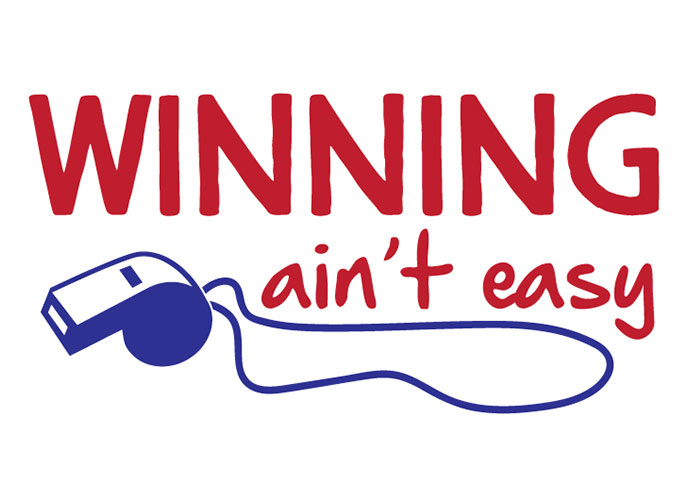
Love that movie…..but when I think of the relationships between Parents and Coaches, I definitely don’t think of them as going together like ‘Peas and Carrots’. In fact, that conflict has driven many out of the profession.
The conflict is an un-winnable battle for coaches….you’re not going to change a parent’s perspective. Because, you cannot have rational discussions with irrational people….and many, many, many parents are completely irrational when it comes to their children. Below is a transcript of a conference I had several years ago. It is not verbatim, but pretty dang close, and it is absolutely without embellishments:
Me: Hi Mr Robinson, thanks for coming in….what can I do for you?
Mr Robinson: Well, why aren’t you playing my daughter more? She’s a Senior and should be on the floor in front of those other kids.
Me: This is competitive athletics, not PE….we don’t play kids simply on the basis of age. Being a senior is no more important than being a sophomore or freshman when it comes to playing time.
Mr Robinson: Well…..she’s better than Betty and Frieda, why do they play more than her?
Me: Legally, I’m not allowed to discuss other kids with you. Plus, it’s just not right….rest assured, I will never discuss your daughter with another parent, so I’m not going to discuss those kids with you. I really think that if we are going to go any further with this, we need to have Phyllis (his daughter) in here….let me call down to the office and get her out of class.
(Awkward pause/silence while we wait for Phyllis to get to my office)
Me: Hi Phyllis….sorry to get you out of class….your dad has brought up some concerns that he has, and I wanted to include you in on the discussion.
Mr Robinson: Phyllis….why do you think Betty plays more than you?
(hoping to get her to say that I was mistreating her)
Phyllis: She’s better than me
Bam!! You would think that ended the complaint right? Wrong! The same parent went on after our meeting to petition the school board for my immediate termination because I was unfair to his daughter……despite the fact that his daughter shot him down in our meeting. Sounds unbelievable doesn’t it? Not to any coach that’s reading this…..
So….what can we as coaches do? There certainly are no fool proof, lock-solid answers to that question, but here are some things to consider and think about:
1 – We as coaches have to understand that few kids, and even fewer parents, are ‘ok’ with not playing. I think that 10-15 years ago, more kids were ok with just being a part of something positive, but nowadays, it’s incredibly rare. If we accept that premise as fact, that means that we really have to examine the benefit of keeping kids around just because they are ‘good kids.’ All coaches want to do that….keep good kids. Simply because we believe in the value of being a part of something bigger than the individual, and we ALL like having good kids around, even if they aren’t overly talented. Plus, it’s emotionally hard on almost every coach that I know, to cut a kid. So, we keep them around and convince ourselves that we will get them into the game often enough to keep them (and their parents) happy. Unfortunately, it just rarely happens that way any more….and in an attempt to try to do a good thing, we’ve built in a likely future problem.
2 – We have to be honest with the kids…..to me being honest consists of the following: Have an individual conversation with each player about their role before the season starts….waaaay before the season starts. In fact, I started having those conversations with kids about the upcoming season, prior to school being out for the summer. I was completely honest with the young lady in the example above, never mislead her. But I wasn’t honest enough….so, as a result, I changed my procedure for those conferences. Here is how I would conduct those conversations later in my career: A week or so prior to our individual player meetings, I listed every player that I knew would be in the program in the next year, separated by position (not age). I gave the list to each player, and asked them to rank themselves only, no one else. During our meeting, I wanted them to be prepared to tell me exactly where they thought they stood….did they believe they were the 3rd best post kid, or 2nd best guard on the list (for example). I would tell them exactly where I thought they stood (all without discussing any other player). Usually, our evaluations were in the same neighborhood. But, when they weren’t, it gave the player plenty of time to think about whether or not they wanted remain a part of the program. Having a kid make the decision not to participate in May, or over the summer, is considerably better than having that kid decide to quit in October.
Being honest also means not using phrases like ‘you control your playing time by how hard you work between now and next season’. I simply don’t believe that is a true statement! Sometimes, the differences between the abilities and talents of two kids is more than can be overcome. Example……let’s say when you have your meetings with kids in May, Joe is just straight up better than Jimmy, and so obviously, Joe played more than Jimmy in the recently concluded season. In your meeting with Jimmy, you tell him that if he gets in the gym, works his tail off over the summer, that he’ll get more playing time. October rolls around, Jimmy has done exactly as you asked….Jimmy’s parents spent the money to get him in camp, get him to workouts, etc….but guess what? So has Joe, and the net result is that Joe is still better. Jimmy did everything you asked him to do, but it didn’t get him more playing time! Guess whose parents are going to be up in the stands talking about how you lied to their son? Obviously, if two kids are close, the amount of work put in is the separator. But, if you believe a kid is not going to get on the court for you, tell them straight up, and tell them before they go thru your pre-season workouts.
3 – I think that it is important to get kids playing time. If you suite a kid up that you can’t get into a game, then the odds are that they probably don’t need to be on the team (see #1 above). Personally, I prefer a pre-scheduled substitution chart for getting this accomplished. This eliminates that conversation after the game that we’ve all had……something like ‘I’m sorry I didn’t get you in…I just didn’t feel like we had the right situation’. With a substitution schedule, the role of each kid is consistent and more clearly defined…..I full heartedly believe that this helps with parent problems. Notice, I said ‘helps’….it didn’t eliminate the problem in the example above, as the young lady actually played in every game. I think one of the biggest triggers for upset parents (and kids) is the ‘surprise’ DNP.
4 – Don’t use the term ‘role player’…..by calling someone a role player you’re usually just saying they’re not good enough to get more minutes. It’s generally used as a euphemism….being labeled a ‘role player’ definitely sounds better than being labeled as someone that can’t play. The reality is that every single kid on your team is a ‘role player’……the key though, is that not every kid has the same role. A kid probably doesn’t need to hear he’s not as good or that he is just a ‘role player’…..but he definitely does need to hear exactly what his role is!
In this profession, you can do everything exactly right, and still have a conflict with a parent. Unfortunately, it is just one of the negatives in a profession that has many, many, positives. Ultimately I think its important to be sure you are constantly evaluating everything in your program and everything that you say to your kids. And, this may be the most important sentence in this post: don’t do something that provides the parent with a bullet to fire at you!
It is a tough profession…..but I believe that if you are in it for the right reasons (kids), work hard, think thru your words and actions, and accept responsibility……you will be standing on high ground when those conflicts do arise (and they will).
